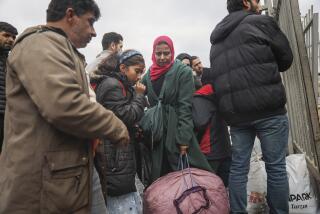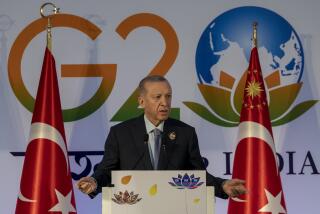Leader Regrets Turkish Stance Toward Kurds
- Share via
ANKARA, Turkey — The prime minister acknowledged Friday that the Turkish government had mishandled its relations with the nation’s minority Kurds, saying their long-running grievances needed to be addressed through greater democracy, not repression.
Prime Minister Recep Tayyip Erdogan’s admission, believed to be the first by a Turkish leader, came during a speech in Diyarbakir, the largest city in the troubled Kurdish southeast and a hotbed of Kurdish nationalism.
The crowds applauded wildly as Erdogan termed the Kurdish issue “my problem, our collective problem.”
“Mistakes have been made,” he said. And to ignore past mistakes, the prime minister declared, was not “fitting behavior for great nations such as Turkey.”
Erdogan’s speech won strong praise from the Kurdish community.
“It constitutes the foundation for turning a new page in relations” between Kurds and the government, said Diyarbakir Mayor Osman Baydemir.
The significance of Erdogan’s words cannot be overestimated, said Sezgin Tanrikulu, chairman of Diyarbakir’s influential bar association. “It’s the first time any Turkish leader is admitting to wrongdoing on the part of the state.”
However, Tanrikulu noted in a telephone interview, “he will need to match his words with deeds.”
For decades, Turkey’s estimated 14 million Kurds were dismissed by successive governments as “mountain Turks.” Their ancient tongue, which is distinct from Turkish, was officially banned until the early 1990s. Thousands of Kurdish activists who demanded official recognition of their ethnic identity were tortured or jailed. Kurdish insurgents waged a running rebellion against the government.
As Turkey seeks to join the European Union, it has begun to ease pressure on the Kurds. Since Erdogan came to power in 2002, his conservative Justice and Development Party has enacted a series of sweeping reforms, among them measures enabling the Kurds to broadcast and publish in their language and teach it in privately run courses.
The changes contributed to European Union leaders’ decision in December to open membership negotiations with Turkey, which are scheduled to begin Oct. 3.
But analysts warn that renewed violence between security forces and the separatist rebel group known as the Kurdistan Workers Party, or PKK, could spark a nationalist backlash that would weaken public support for reform.
Scores of Turkish soldiers have died in attacks that have spread across the southeast since the PKK called off a five-year unilateral truce in June 2004. In the latest incident, two soldiers were killed Thursday in Tunceli province.
In an ominous sign early this month, Gen. Hilmi Ozkok, chief of the general staff, pointedly spoke of the army’s newly “restricted powers” while saying that the fight against the PKK would continue nonetheless.
He was referring to recent EU-inspired laws that have trimmed the influence of the country’s hawkish generals.
Deniz Baykal, the leader of the main opposition Republican People’s Party, charged Thursday that “the changes made in the name of democracy will lead to Turkey’s dismemberment.”
“The challenge facing Erdogan,” one veteran Kurdish politician said, “is to strike a balance between the demands of the military and his nationalist constituents on the one hand and those of the European Union and the Kurds on the other.
“It’s a very, very fine line,” the politician, Serafettin Elci, said in a telephone interview.
Analysts say the PKK has resumed its rebellion to pressure Erdogan’s government to sit down at the negotiating table and end the solitary confinement of rebel leader Abdullah Ocalan.
Ocalan, who was captured by Turkish special forces in 1999 and sentenced to death on treason charges, remains the sole inmate of an island prison off the coast of Istanbul. His sentence was commuted to life imprisonment after the government abolished the death penalty in 2003 in an attempt to win favor with the EU.
A top rebel commander was quoted by the pro-Kurdish MHA news agency Friday as saying that the PKK would call a cease-fire only if the military halted its operations.
Erdogan has rejected rebel calls to negotiate a truce, saying he will not talk to “terrorists.” And in an apparent effort to calm nationalist passions ahead of his trip to the Kurdish region, he traveled to the Aegean port city of Izmir on Thursday, where he met with the families of soldiers recently slain by insurgents.
“Terrorism and violence are the greatest enemies of this country,” Erdogan said Friday. “And I repeat that we shall never allow them to prevail.”
More to Read
Sign up for Essential California
The most important California stories and recommendations in your inbox every morning.
You may occasionally receive promotional content from the Los Angeles Times.













